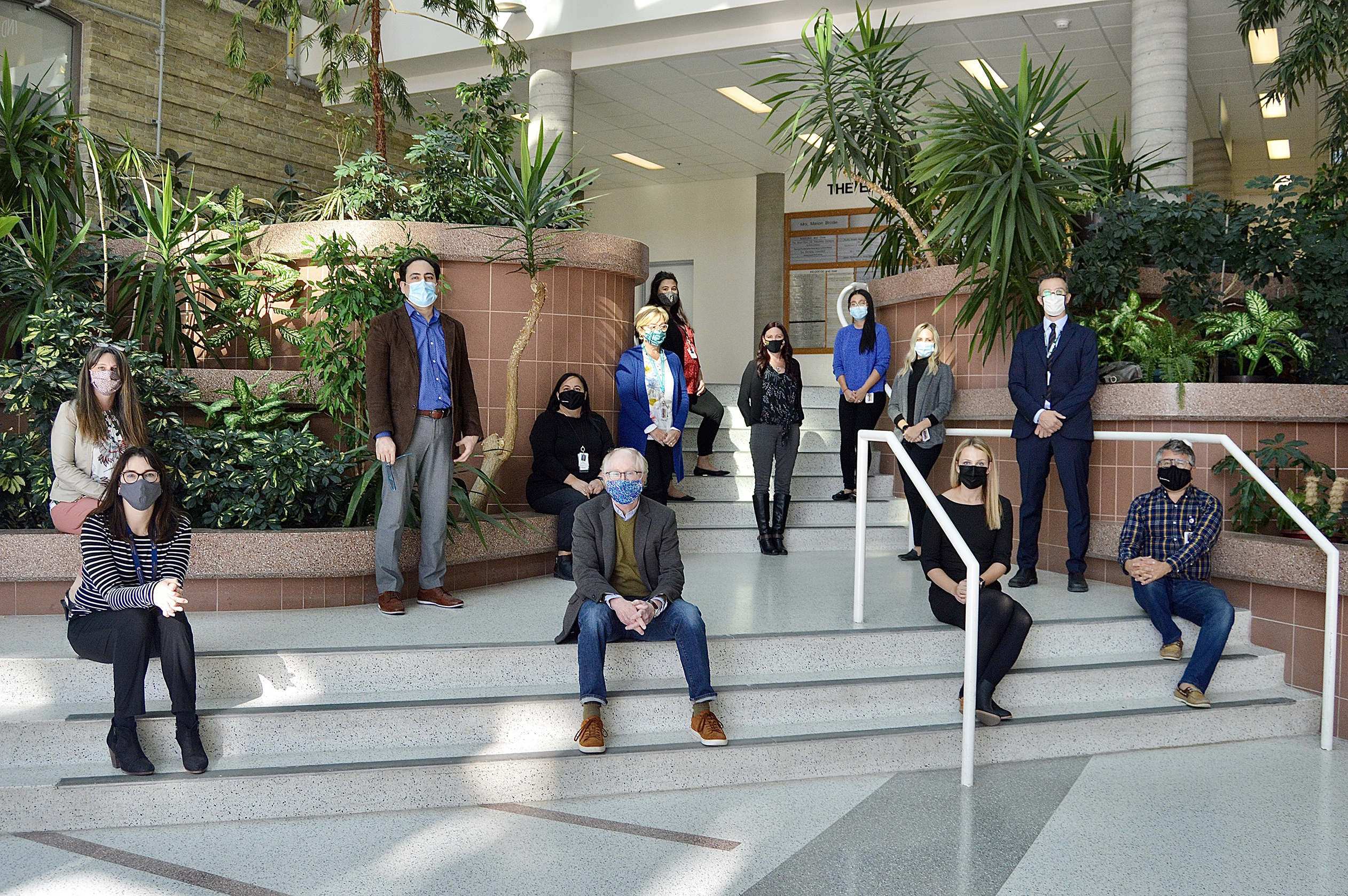Bottom row L-R: Dr. Emily Rimmer, Gary Annable, Dr. Brett Houston, Dr. Glenn Drobot
Top row L-R: Sheri Stein, Hessam Kashani, Nicole Marten, Maureen Hutmacher, Dr. Lauren Kelly, Dayna Solvason, Nora Choi, Maggie Wilson, Dr. Ryan Zarychanski
Through the generous support of our community, Victoria Hospital Foundation recently partnered with Research Manitoba to invest $100,000 in new Manitoba clinical trials related to COVID-19.
This investment was part of $1.4 million in funding from various partners to support eight clinical trials by world-class Manitoba research teams led by Dr. Ryan Zarychanski, an associate professor, hematologist, and critical care physician at the University of Manitoba and CancerCare Manitoba.
Prior to COVID-19, Dr. Zarychanski had been working on a clinical trial involving blood clots. As COVID-19 began spreading from country to country, Dr. Zarychanski began receiving emails from colleagues around the world about the potential of adapting his trial.
Long before COVID-19 reached Canada, it became clear to Dr. Zarychanski that COVID-19 was going to be a major global threat and that it would be valuable to look at repurposing various drugs to see if a helpful therapy could be found.
“We knew that time was of the essence and that information was needed as quickly as possible,” said Dr. Zarychanski.
So that Manitobans could have access to cutting-edge therapies and contribute to knowledge generation around the world, Dr. Zarychanski and his teams rapidly developed or deployed eight clinical trials involving six different therapies. The trials developed in Manitoba enrolled patients from five continents and included many patients from Manitoba.
The funds invested from the Victoria Hospital Foundation and Research Manitoba partnership supported two of these trials, one of which ultimately became the first clinical trial in Manitoba designed to help stop the spread of COVID-19. This clinical trial focused on hydroxychloroquine, a drug commonly used for the treatment and prevention of malaria, as well as in the treatment of conditions such as lupus and rheumatoid arthritis. The hydroxychloroquine clinical trial began in March 2020, the same month the global pandemic was declared. At the time, there was a large amount of media attention surrounding hydroxychloroquine and its possible role as a therapy.
Dr. Zarychanski credits the early support of funders for helping the team get these clinical trials off the ground right away.
“Clinical trials are enormously expensive,” said Dr. Zarychanski. “Considerable time is needed to fund an entire trial, but strong starts can be leveraged, and the funds provided by Victoria Hospital Foundation and Research Manitoba helped to provide this strong start. When the time came, we were already underway, providing unproven treatment options to Manitobans as part of clinical trials, and discovering new therapies that would eventually be used around the world to treat COVID-19.”
The hydroxychloroquine clinical trial explored whether this drug could be a useful treatment for individuals with COVID-19, family members living with individuals who have COVID-19, and healthcare workers who had been exposed to patients with COVID-19. This trial included participants from Manitoba, Quebec, Alberta, and Minnesota. The findings indicated that hydroxychloroquine did not prevent infection or reduce symptoms.
Dr. Zarychanski says these findings were important as it gave researchers the opportunity to redirect their focus to other possible drugs which may prove to be effective.
“This clinical trial provided the first high-level evidence to abandon use of this drug,” said Dr. Zarychanski. “We were the first randomized trial to be published. We led the charge and signaled the urgent need to explore other therapies.”
In two other trials developed in Manitoba and led by Dr. Zarychanski, the team found that the inexpensive blood-thinning drug called heparin decreased mortality, the need for life support, and improved outcomes in hospitalized COVID-19 patients. Given the number of COVID-19 patients requiring hospitalization, it is anticipated that this treatment will reduce pressure in intensive care units around the world. Helping to fund this international trial has already directly benefitted Manitobans, as there was substantial participation in these trials from Winnipeg hospitals. The results are now being taken up across the world.
Dr. Zarychanski believes the impact of donor support to research cannot be understated.
“These funds allowed us to launch high quality clinical trials and capture the attention and confidence of patients and decision-makers,” said Dr. Zarychanski. “An investment in a successful team will turn a well-founded scientific hypothesis into knowledge, and then knowledge into action that will impact care. Instead of guessing what therapies would ultimately be effective, these funds allowed us to provide evidence to justify decisions – to prove what works and should be adopted and likewise prove what’s not worth our time or investment. With the support of Victoria Hospital Foundation and other funders, we were able to finish as strongly as we started.”
Victoria Hospital Foundation's $100,000 investment in the COVID-19 clinical trials is part of an inaugural strategic partnership with Research Manitoba to advance research in our province and support made-in-Manitoba solutions from our own talented local researchers. Thanks to the generosity of our supporters, Victoria Hospital Foundation has invested an additional $180,000 in an innovative telepresence robot project to support individuals living with dementia and their caregivers, as well as $55,000 investment in a health research competition through this strategic partnership.




